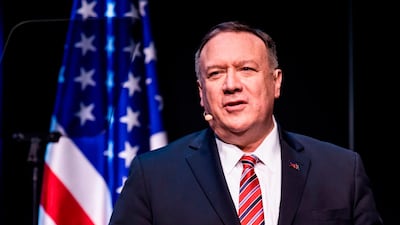US Secretary of State Mike Pompeo said on Monday that the Iranian government is at its “weakest stage”, warning its leaders that any further escalation with the United States “will end it on our terms.”
Speaking at the Hoover Institute in California, Mr Pompeo said the Trump administration's strategy and actions including the killing of Iranian General Qassem Suleimani on January 2, have been aimed to "re-establish deterrence" against Tehran.
He said prior American administrations didn’t do enough to deter Iran, but that the “[Iranian] regime must certainly understand [now] what we will do for American lives”, following the Trump administration’s retaliation in Iraq to killing of US contractor.
While Mr Pompeo said he was grateful that Iran’s retaliation inside Iraq did not bring any casualties, he warned that if Tehran “escalates we will end it on our terms … we are determined not to lose this deference.”
The US chief diplomat said Iran is now at “its weakest stage” as the weight of US sanctions takes heavy toll on the economy and popular opposition protests grow inside Tehran.
“We just want Iran to behave like a normal nation. Just be like Norway,” Mr Pompeo said.
Asked about withdrawing from Iraq, Mr Pompeo said he has had around 50 calls with Iraqi leaders in the last week and a half. He said the US will work with Iraqi leaders to “get to the right place” on the issue.
On the issue of designating the Muslim Brotherhood as a terrorist organisation, Mr Pompeo said that the Trump administration is still studying whether there is a legal basis to classify entities associated with the Muslim Brotherhood as terrorists. He argued that the issue deserves more “nuance”, that there are different factions within the group and the administration is “trying to figure out how to get it right.”
After publicly defending the killing of Suleimani, Mr Pompeo has ignited controversy with Congress for declining to testify on the issue. House Foreign Affairs Committee Chairman Eliot Engel said on Monday that the US Secretary of State has declined to appear for testimony on Tuesday.
“I’m disappointed and frustrated that Secretary Pompeo will not appear before the committee tomorrow. Each passing day raises new questions about the strike that killed General Suleimani. Was there really an imminent threat?”, Mr Engel said in a statement.
CNN reported on Monday that State Department officials involved in US embassy security were not made aware of imminent threats to four specific US embassies that the American president said would have been targets of Suleimani.


















